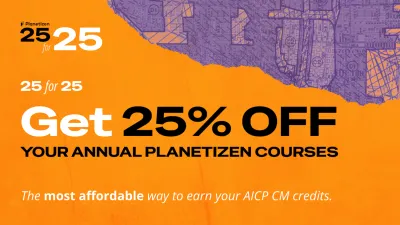In the Northern Hemisphere, many students are starting urban planning degree programs. How can students position themselves for a productive and meaningful education in planning.

In the Northern Hemisphere, many students are starting urban planning degree programs. It can be a time of great excitement but also many decisions. Students wonder how to get the most out of their efforts and position themselves for a productive and meaningful education in planning. Over the years, I have written several blogs on making the most of being a student. Here, I recap some major insights.
Becoming a planner involves more than knowledge about the field and skills in planning techniques; values and ethics are also crucial. It is no accident that understanding the ethical and value aspects of planning is a key part of planning accreditation. There are many dimensions to this. You have your own values. You will work in and with communities that have expressed values through who they elect. In any specific planning activity, various constituencies will have ethical positions. In planning, the line between a value—like equity—and a particular planning strategy is not always direct. For example, one strategy like allowing more development in a municipality can fulfill multiple values, including equity (more affordable housing is built) and individual property rights (the owner is less constrained in what they can do in their property). Similarly, a single value like promoting ecological sustainability can lead to high-density development in some locations and low-density development in others. Your time in a planning program is a great time to reflect on this complexity.
Faculty have planned your planning education, generally providing the basics to start and giving you more choices later on. This approach gives you time to decide about your focus. While waiting until the second semester or second year to dig into your specialty can be frustrating, it has advantages. One philosophy of planning education, articulated in the 1950s by Harvey Perloff, is that planners are “generalists with a specialty.” Thus, planning education typically starts with a core of knowledge needed by most planners, followed by concentration on topics students find most appealing or relevant. This generalist component gives planners a solid common core and understanding of related fields, allowing them to become skilled conveners in a siloed world. The specialty develops some expertise. Also, many students come to graduate programs interested in learning how to do something, like promoting affordable housing, which is just one tool for achieving broader aims such as social equity. By the second year, students may see more value in learning about other tools. Having some time to decide on how to specialize allows you to select courses and other educational experiences more effectively.
While faculty are important in your learning journey, you have a lot of agency. While there may be an expectation that faculty deliver instruction, many planning courses are designed to produce learning through engaging in projects. Peer-to-peer learning is also vital as you collaborate in teams or discuss issues in class. Developing skills to produce your own learning, and encourage peers to also learn, helps both in your degree and as you start upon a lifetime of learning.
The field of planning is complex. Many constituencies are involved. The context changes over time. Using your time at graduate school to explore ethics and values, understand the general field and some specific subfields, and develop your own capacity to learn helps you get started. Becoming a planner is a lifetime endeavor, and graduate planning education launches that journey.

Planetizen Federal Action Tracker
A weekly monitor of how Trump’s orders and actions are impacting planners and planning in America.

Restaurant Patios Were a Pandemic Win — Why Were They so Hard to Keep?
Social distancing requirements and changes in travel patterns prompted cities to pilot new uses for street and sidewalk space. Then it got complicated.

Map: Where Senate Republicans Want to Sell Your Public Lands
For public land advocates, the Senate Republicans’ proposal to sell millions of acres of public land in the West is “the biggest fight of their careers.”

Maui's Vacation Rental Debate Turns Ugly
Verbal attacks, misinformation campaigns and fistfights plague a high-stakes debate to convert thousands of vacation rentals into long-term housing.

San Francisco Suspends Traffic Calming Amidst Record Deaths
Citing “a challenging fiscal landscape,” the city will cease the program on the heels of 42 traffic deaths, including 24 pedestrians.

California Homeless Arrests, Citations Spike After Ruling
An investigation reveals that anti-homeless actions increased up to 500% after Grants Pass v. Johnson — even in cities claiming no policy change.
Urban Design for Planners 1: Software Tools
This six-course series explores essential urban design concepts using open source software and equips planners with the tools they need to participate fully in the urban design process.
Planning for Universal Design
Learn the tools for implementing Universal Design in planning regulations.
Heyer Gruel & Associates PA
JM Goldson LLC
Custer County Colorado
City of Camden Redevelopment Agency
City of Astoria
Transportation Research & Education Center (TREC) at Portland State University
Camden Redevelopment Agency
City of Claremont
Municipality of Princeton (NJ)






























